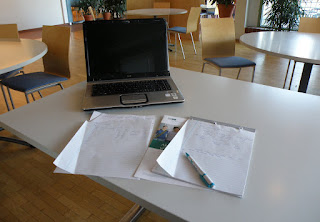We at Tuokko have a strong vision of transforming the way that groceries get to your own home.
Currently at least in Finland (pop. 5,2 million) the groceries logistics is a central chain-driven, self-service model. There are a few large companies working in everyday retail, and they have ordinary supermarkets and smaller markets.
Essentially everyone who wants to get hold of foodstuff, visits the closest
or otherwise best suitable shop 2-4 times a week. Getting groceries takes around 50-55
minutes daily per household, a national average.
Because the old small shops lost the competition to big chains, the consumer got
a little bit hurt: the economies of scale are deciding the game. It means that
an individual consumer has lost quite a lot of the power to decide what kind of things
the shop should preferably serve. Instead the consumer runs after several shops
in some cases - for example, a conscientious ethical consumer is likely not to get
all the stuff from a single shop. This makes the shopping even more timeconsuming,
and in addition to that, it also increases the fuel consumption - which is something
that almost all of us think is a negative thing. Not only because the fuel costs,
but because it spoils the environment and brings about toxic gases and particles.
Speaking in terms of numbers, we're looking to make this kind of impact:
Here are the 15 reasons that could make Tuokko service fly:
- if the consumer doesn't have a car available
- traffic congestion
- time consumption is considered negative
- sometimes the shopping malls are frustratingly large and difficult to navigate
- the sheer amount of walking in the shop is boring
- some people experience the carrying of groceries extremely difficult due to
weight
- difficulty of understanding how the shop "works", ie. where its functions are
located
- no-one loves queuing!
- parking place problems and the very increased possibility of getting a dent in
the car (insurance companies have noticed this, that a considerable amount of
crashes happens at slow speeds in parking places)
- children do not want to go to the shop, or make a show there
- pets and shops not very compatible due to regulations
- faced with 10,000+ products, it is difficult to make a reasonable shopping cart
contents. People get confused at this amount of selection.
- difficulty pinpointing (locating) specific foodstuff or other products
- noticing at checkout, that the contents of the shopping cart have been formed
almost randomly, and costs are sometimes surprising
- it is not easy to determine the realtime value of one's shopping cart
Currently at least in Finland (pop. 5,2 million) the groceries logistics is a central chain-driven, self-service model. There are a few large companies working in everyday retail, and they have ordinary supermarkets and smaller markets.
Essentially everyone who wants to get hold of foodstuff, visits the closest
or otherwise best suitable shop 2-4 times a week. Getting groceries takes around 50-55
minutes daily per household, a national average.
Because the old small shops lost the competition to big chains, the consumer got
a little bit hurt: the economies of scale are deciding the game. It means that
an individual consumer has lost quite a lot of the power to decide what kind of things
the shop should preferably serve. Instead the consumer runs after several shops
in some cases - for example, a conscientious ethical consumer is likely not to get
all the stuff from a single shop. This makes the shopping even more timeconsuming,
and in addition to that, it also increases the fuel consumption - which is something
that almost all of us think is a negative thing. Not only because the fuel costs,
but because it spoils the environment and brings about toxic gases and particles.
Speaking in terms of numbers, we're looking to make this kind of impact:
- decrease the daily time allocated to taking care of groceries, down from 52 minutes to initially 20 minutes (including shipment reception), and ultimately to 5 minutes. The way that this can be done is by utilization of many different techniques: automated inventory control, automated shipping thresholds, learning patterns of consumption, and proactive offers.
Here are the 15 reasons that could make Tuokko service fly:
- if the consumer doesn't have a car available
- traffic congestion
- time consumption is considered negative
- sometimes the shopping malls are frustratingly large and difficult to navigate
- the sheer amount of walking in the shop is boring
- some people experience the carrying of groceries extremely difficult due to
weight
- difficulty of understanding how the shop "works", ie. where its functions are
located
- no-one loves queuing!
- parking place problems and the very increased possibility of getting a dent in
the car (insurance companies have noticed this, that a considerable amount of
crashes happens at slow speeds in parking places)
- children do not want to go to the shop, or make a show there
- pets and shops not very compatible due to regulations
- faced with 10,000+ products, it is difficult to make a reasonable shopping cart
contents. People get confused at this amount of selection.
- difficulty pinpointing (locating) specific foodstuff or other products
- noticing at checkout, that the contents of the shopping cart have been formed
almost randomly, and costs are sometimes surprising
- it is not easy to determine the realtime value of one's shopping cart


